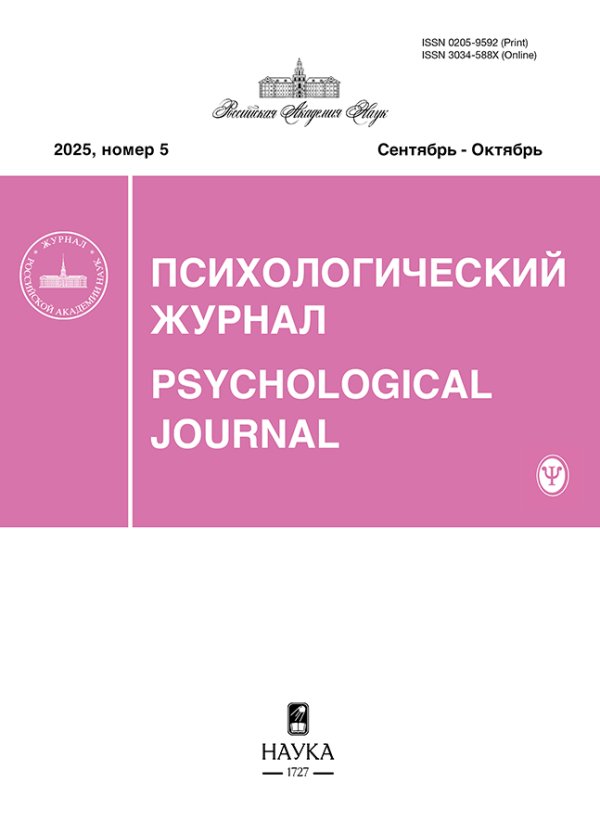“На мосту” или “на берегу”? О роли “Заявки позиции” в межпарадигмальной координации психологических подходов
- Авторы: Нуркова В.В.1,2
-
Учреждения:
- ФГБУН Институт психологии РАН
- ФГБОУ ВО “Российская академия народного хозяйства и государственной службы при Президенте Российской Федерации”
- Выпуск: Том 46, № 2 (2025)
- Страницы: 122-129
- Раздел: Дискуссия
- URL: https://rjsvd.com/0205-9592/article/view/683557
- DOI: https://doi.org/10.31857/S0205959225020139
- ID: 683557
Цитировать
Полный текст
Аннотация
Текст представляет собой дискуссионный отклик на коллективную монографию “Научные подходы в современной отечественной психологии”. Замысел редакторов издания и авторов обобщающей вводной главы интерпретируется как задел для формирования методологических оснований системы межпарадигмальной коммуникации и координации. Формулируется догадка о том, что за метафорой межпарадигмальных “мостов” стоит категория субъекта, которая мыслится авторами в качестве потенциального связующего звена между подходами. Обсуждается актуальный в контексте социальной ситуации организационного плюрализма современной психологии запрос на рефлексию смыслообразующего и структурирующего вклада личности исследователя в научную деятельность, что проявляется в стандарте “заявки позиции”. Утверждается, что интериоризированная методология является атрибутом личности ученого. Причем рефлексия авторской пристрастности не препятствует налаживанию межпарадигмального полилога, а, наоборот, повышает способность к “научной эмпатии”. Предлагаются три варианта межпарадигмального взаимодействия, которые, по моему мнению, поддерживают развитие самобытных исследовательских подходов. “Сосредотачивающее” движение направлено на удержание аутентичных признаков оригинальной версии композита всех уровней оригинальной методологической платформы психологии, что воплощается в репликации на новом материале “фирменных” достижений подхода. “Генерализующее” движение состоит в ассимиляции достижений иных подходов в статусе аналогов (т.е. имеющих разнородное происхождение, но ведущих к идентичным следствиям) “внутренних” достижений. Наконец, движение, условно названное “экуменическим”, заключается в интеграции исторически дифференцированных подходов в более крупные методологические кластеры на основании единства общенаучных принципов и философских источников, что ведет к их взаимному усилению.
Полный текст
Об авторах
В. В. Нуркова
ФГБУН Институт психологии РАН; ФГБОУ ВО “Российская академия народного хозяйства и государственной службы при Президенте Российской Федерации”
Автор, ответственный за переписку.
Email: nourkovavv@ipran.ru
Доктор психологических наук, профессор РАН, заведующая лабораторией психологии личности ИП РАН, ведущий научный сотрудник Школы антропологии будущего ИОН РАНХиГС
Россия, 129366, г. Москва, ул. Ярославская, д. 13, корп. 1; 119606, г. Москва, просп. Вернадского, д. 84, с. 1Список литературы
- Асмолов А.Г. По ту сторону сознания: методологические проблемы неклассической психологии. М.: Смысл, 2002.
- Бондарев А.П. Замысел и воплощение // Вестник Московского государственного лингвистического университета. Гуманитарные науки. 2015. № 23(734). С. 7–37.
- Волков С.М. Диалоги с Бродским. М.: ЭКСМО, 2012.
- Выготский Л.С. Психология и учение о локализации психических функций // Собр. соч.: В 6 т. Т. 1. М.: Педагогика, 1982. С. 168–174.
- Выготский Л.С. Орудие и знак в развитии ребенка // Собр. соч.: В 6 т. Т. 6. М.: Педагогика, 1984. С. 6–86.
- Журавлев А.Л., Сергиенко Е.А. Современные подходы в отечественной психологии: единство в разнообразии // Психологический журнал. 2024. Т. 45. № 4. С. 114–128.
- Лакатос И. Фальсификация и методология научно-исследовательских программ. М., 1995.
- Леонтьев А.Н. Лекции по общей психологии / Под ред. Д.А. Леонтьева, Е.Е. Соколовой М.: Смысл, 2001.
- Мазилов В.А. Интеграция научного знания в психологии // Теория и методология психологии: Постнеклассическая перспектива / Отв. ред. А.Л. Журавлев, А.В. Юревич. М.: Изд-во “Институт психологии РАН”, 2007. С. 427–458.
- Мертон Р.К. Социальная теория и социальная структура. М.: “Аст”, 2006.
- Научные подходы в современной отечественной психологии / Отв. ред. А.Л. Журавлев, Е.А. Сергиенко, Г.А. Виленская. М.: Изд-во “Институт психологии РАН”, 2023.
- Нуркова В.В. Эволюционный поворот культурно-исторической психологии и теория когнитивных гаджетов: аналоги или гомологи? // Вопросы психологии. 2019. № 4. С. 29–40.
- Нуркова В.В. Эмпатия-отождествление и Эмпатия-моделирование: о культурном конструировании двух модусов совместной деятельности // Вопросы психологии. 2020. Т. 66. № 3. С. 3–13.
- Перлов А.М. Четыре установки в теории гуманитарного исследования: Позитивизм. Интуитивизм. Спекулятивизм. Критическая установка. М.: 2018.
- Рубинштейн С.Л. Основы общей психологии: в 2 т. Т. 1. М.: Педагогика, 1989.
- Сергиенко Е.А. Межпарадигмальные мосты // Психологические исследования. 2016. Т. 9. № 48. С. 4.
- Смирнов С.Д. Методологический плюрализм и предмет психологии // Вопросы психологии. 2005. № 4. С. 3–8.
- Стёпин B.C. Саморазвивающиеся системы и постнеклассическая рациональность // Вопросы философии. 2003. № 8. С. 5–17.
- Тихомиров О.К. Психология мышления. М., 1984.
- Фейерабенд П. Против метода. Очерк анархистской теории познания // Фейерабенд П. Избранные труды по методологии науки. М., 1986. С. 125–465.
- Юдин Э.Г. Системный подход и принцип деятельности: методологические проблемы современной науки. М., 1978.
- Roberts S.O. Dealing with Diversity in Psychology: Science and Ideology // Perspectives on Psychological Science. 2024. V. 19. № 3. P. 590–601.
Дополнительные файлы











